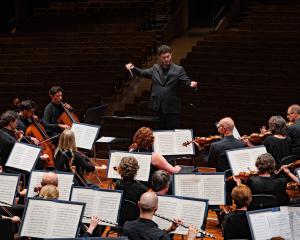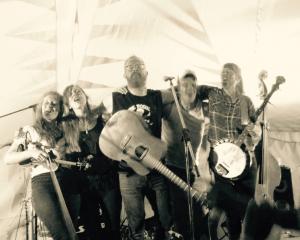Jake Wilson has been going to some lengths to complete his latest musical project.
In tribute to the doomed 1912 South Pole expedition of Captain Robert Falcon Scott, the English folk guitarist recently released a five-song mini-album that involved many months of meticulous research.
All's Well is told from the points of view of the men who died on their return journey from the South Pole 100 years ago: Edgar Evans, Lawrence Oates, Edward Wilson, Henry Bowers and Scott himself. The songs aim to capture the different responses of the five men as they realised their deaths were inevitable.
Not content with merely recording a tribute to Scott and company, Wilson is now about to embark on his own extraordinary expedition, performing his songs at Scott's Hut on Cape Evans, in the Antarctic. To cope with the extreme conditions, Wilson has been visiting some unusual places of late.
''I've been practising in a storage fridge which is kept at a temperature just above freezing,'' the 34-year-old explains via phone from his home in Peckham, South London.
''In fact, this weekend I am going to practise in a freezer. A chain of frozen-food stores have given me permission to do so. That will be a test. I am going to see if I can get by using a form of fingerless glove,'' says Wilson, who will leave behind his usual wooden guitar in favour of a graphite model likely (though not certain) to be more acoustically stable in the cool of Ross Island.
Wilson has secured a place on one of the few ships travelling to Scott Hut this season for himself and a cameraman with whom he has worked on projects for the BBC, the Open University and the Roald Dahl Estate.
''The cruise itself is 30 days long. I start in Invercargill and finish in Ushaia, Argentina. The ship will be in the Ross Sea, near Scott's Hut, for only four or five days, one day of which will be at the hut.
''This particular operator offers a day trip to Scott's Hut. But in order for me to do this I will need more time than the typical tourist is allowed, so they are arranging that for me,'' he explains.
Weather permitting, Wilson hopes to perform his songs at Scott's Hut on March 2. In the meantime, he has arranged a series of performances in Otago and Southland this month.
Wilson's interest in Scott's final Antarctic expedition was triggered when he discovered an edition of Scott's journals in his parents' house.
''That was several years ago,'' he recalls.
''The kind of work I had done before this also played a part,'' he says, referring to his role as a researcher for the BBC art history series, The Private Life of a Masterpiece, for several years.
''At university I studied ancient Egypt and Mesopotamia. That required me to look as hard as I could at material, to get to the core of what people thought a very long time ago.
''It was a similar experience when I read Scott's journals. When I realised that the other party members' journals also existed then suddenly I could look very deeply into the subject.
''I think it took me about a year to write a song after first reading the journals. To start off, I was just reading the journals for interest. I suppose lurking in the back of my mind was the idea that something could be made from this. The songs took me by surprise.
''I wanted to make it as authentic as possible. I really did read everything I could lay my hands on. I wanted to know how each of those five men wrote and spoke, what their characters were,'' Wilson says.
''I also wanted a musical authenticity as well, so each song had to evoke something of each man. And I didn't want any showmanship in terms of production. I recorded it live and played as hard as I could. There is no cheating.
''Given the men themselves did what they did - they pulled all this gear and worked hard - I owed it to their memories to also work honestly.
''I also wanted to explore the versatility of hybrid fingerstyle,'' Wilson says, referring to a guitar technique in which the player uses a plectrum held between thumb and index finger while employing the remaining fingers to pluck strings as well. As many guitarists will attest, it is not the easiest technique to master.
Still, it seems Wilson is no ordinary musician. After training as a classical violinist and piano player, he travelled to India to study the sitar before focusing his attention on the guitar, inspired particularly by the playing of British folk-rock pioneer Richard Thompson. Wilson now performs with ex-Fairport Convention fiddler Dave Swarbrick, who spotted him at an English folk club.
Wilson's tribute to Scott's party also has a personal note. He composed them in the wake of his mother's sudden death from cancer and recorded them shortly after the death of a close friend, English cult novelist and children's writer Russell Hoban.
''There is an authenticity of research. But what I didn't expect was an emotional authenticity. That came by observing what my mother experienced in the last few months of her life.
''Suddenly, I was faced with the brutal reality of what Scott and his men must have gone through.
''My mother was also in a race against time, battling against her own body as it failed her. And her response was extremely similar - organising her affairs, writing letters to people who she felt needed to have heard from her, and facing death with dignity and courage.''
By the time Wilson had penned three of his songs, he summoned the courage to inform the Scott Polar Research Institute, which endorsed the project. It has also been supported by descendants of the original team-members. As a result, Wilson has performed at official events in the United Kingdom as part of the centenary commemorations.
''Up until the decision to go to Antarctica, everything has been self-funded. However, Antarctica is off the scale, financially, so an individual has donated some money, but I have also had to take out a loan.
''Until a few months ago, I had no intention of going to Antarctica. I don't know what happened but recently I thought I had to go. First, I had to ask permission from the New Zealand Antarctic Heritage Trust. Once they said yes, I had to find out how I could get there.''
See him, hear him
Jake Wilson performs All's Well at the following venues in the South:
Oamaru Opera House (The Chambers), tomorrow, 3pm; Otago Museum (Barclay Theatre), Tuesday, 6pm; Port Chalmers Library, Thursday, February 14, 6.30pm; Dunedin Public Library, Friday, February 15, 12.30pm; Southland Museum and Art Gallery (Gallery 3), Invercargill, Saturday, February 16, 2pm.
Scott's story
On Thursday January 18, 1912, a British team led by Captain Robert Falcon Scott arrived at the South Pole, travelling on foot and dragging their equipment and provisions behind them on a sledge. There they discovered a Norwegian team headed by Roald Amundsen had reached the pole one month earlier, using sledges pulled by teams of dogs.
None of the British team survived the gruelling 900-mile (1448km) journey back from the pole: Evans collapsed on February 17; Oates walked to his death on March 17 to avoid slowing his companions down as his condition deteriorated; and Wilson, Bowers and Scott died in their tent at the end of March, after being trapped by a blizzard for several days without food and fuel, just 18km from their next depot.
A search party found this tent eight months later. Rather than disturbing the three bodies inside it, the tent was collapsed and a large snow cairn was built over it, topped with a cross and flanked by a pair of upright sledges. The bodies of Evans and Oates could not be found.












